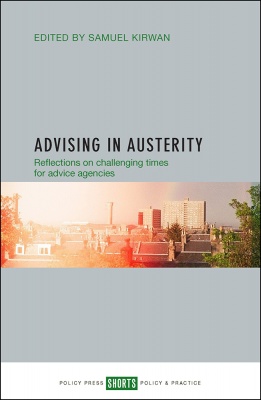
Dr Sarah Moore, Lecturer in Sociology (Department of Social and Policy Sciences, University of Bath).
The PolicyBristol blog has the pleasure of welcoming this guest post by Dr Sarah Moore, who was one of the participants in the recent book launch of Advising in Austerity. Reflections on challenging times for advice agencies (Policy Press, 2017). Dr Moore is also the co-author of Legal aid in crisis. Assessing the impact of reform (Policy Press, 2017) and offers here her insightful views on the need to boost the activities and funding of the legal advice sector.
Anyone familiar with legal aid reform will know that the Legal Aid and Sentencing of Offenders Act 2012 (LASPO) has dramatically altered the meaning and nature of legal aid. It has meant, amongst other things, a significant reduction in funding, largely achieved by taking a large number of areas of civil law out of scope, including private family law cases, and almost all cases involving social welfare, housing, medical negligence, immigration, debt, and employment.
The most strenuous critics of LASPO have pointed out that the recent funding cuts restrict people’s access to justice. In answering to these problems, LASPO incorporated a set of exceptions. Those who could provide evidence that they had been victims of domestic violence, for example, were to be given access to legal aid to pursue family law cases. And an Exceptional Case Funding caveat was incorporated in the Act for those who could successfully make a case that their human rights would be breached without publicly-funded legal assistance. Both have been woefully inadequate.
Research led by Rights of Women indicates that, even after the government relaxed the rules on domestic violence evidence and legal aid eligibility, a significant proportion of female victims (38% in their 2014 survey) did not have the mandatory evidence to receive publically-funded support. And the Exceptional Case Funding (ECF) scheme has been a disaster by anyone’s standards. In the first year post-LASPO, the Legal Aid Agency received only 1,520 applications for ECF. According to the Public Accounts Committee, only 69 were granted funding. That is far, far fewer than the Ministry of Justice and Legal Aid Agency had predicted in the post-LASPO period. Applications have picked up in the last year, as has the acceptance rate, but the fact remains that this safety net is sorely under-used. Continue reading



